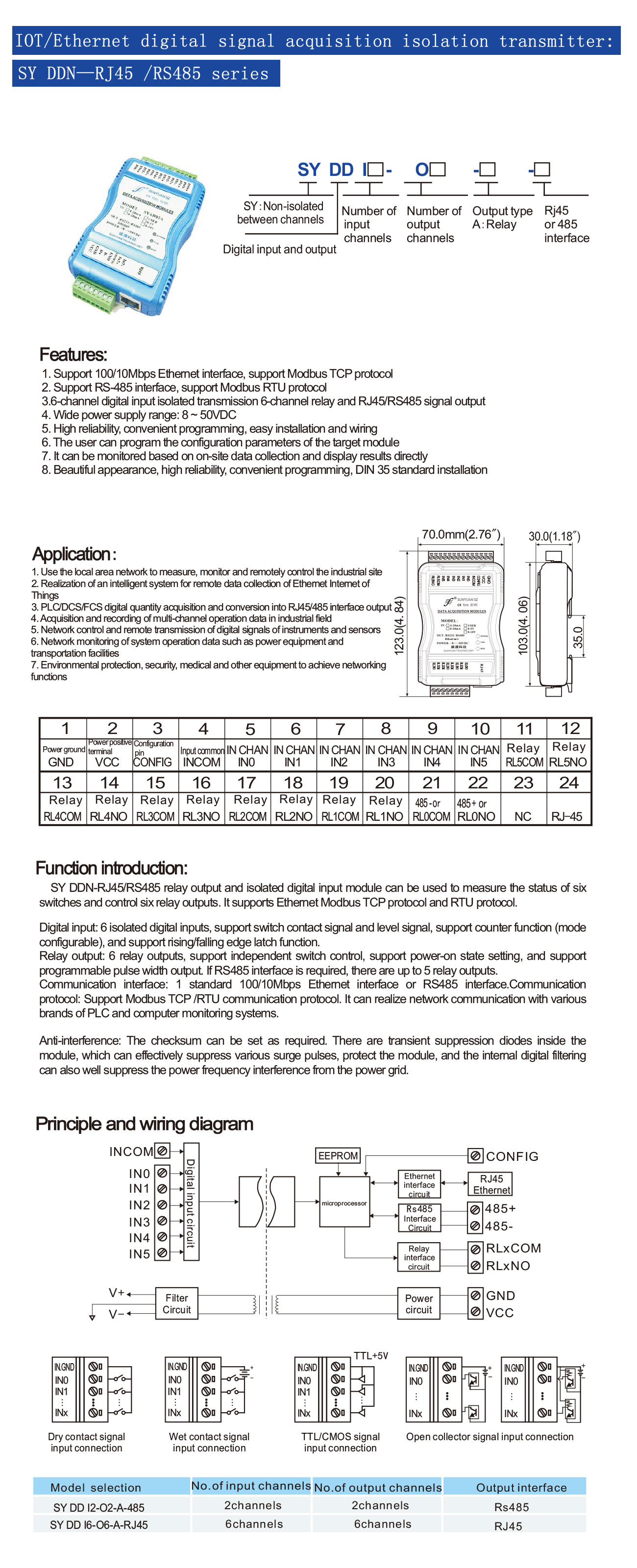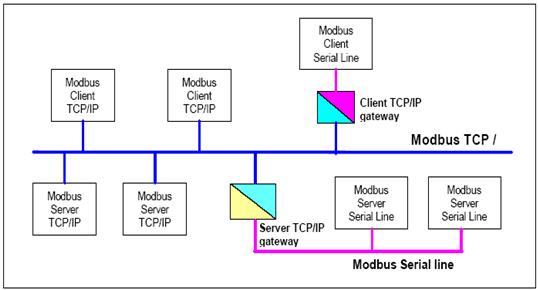IOT Ethernet Digital Signal DA Acquisition Smart Sensor Module: SY DDN-RJ45 / RS485 Series

SY DDN-RJ45 series products can realize the input and output of collected switching signals to control remote equipment.SY DDN-RJ45 series products can be applied in Ethernet industrial automation control system, monitoring and control, as well as industrial field signal isolation and long-wire transmission and so on.
The products include power isolation, input and output signal isolation, and Ethernet communication. The communication method adopts Modbus TCP of Ethernet, its instruction set is compatible with ADAM module, the configuration parameters can be set by the user, and it can be hooked on the same bus with other manufacturers' control modules, which is convenient for computer programming.
SY DDN-RJ45 series products are intelligent monitoring and control system based on microcontroller, all user-set configuration information such as IP address, port number and status are stored in non-volatile memory EEPROM.
SY DDN-RJ45 series products are designed and manufactured according to industrial standards, signal input/output isolation, can withstand 3000VDC isolation voltage, strong anti-interference ability, high reliability. Operating temperature range - 25℃~+70℃.
SY DDN-RJ45 Function Introduction
SY DDN-RJ45 Relay Output and Isolated Digital Input Module can be used to measure the status of six switches and control six relay outputs, supporting Ethernet Modbus TCP protocol.
1、 Digital Input
6-channel isolated digital inputs, support switch contact signals and level signals, support counter function (mode configurable), as well as support rising/falling edge latch function.
2、 Relay output
6-channel relay output, support independent switch control, support power-on state setting, support programmable pulse width output.
3. Communication
Communication interface: 1 channel standard 100/10Mbps Ethernet interface.
Communication protocol: support Modbus TCP communication protocol. Can realize network communication with many brands of PLC, computer monitoring system.
4、 Anti-interference
The calibration sum can be set as required. Transient suppression diode inside the module can effectively suppress all kinds of surge pulses and protect the module, and the internal digital filtering can also well suppress the industrial frequency interference from the power grid.
SY DDN-RJ45 General Specifications
(typical @ +25°C, Vs is 24VDC)
Input type: 6-channel isolated digital
Output type: 6-channel relay
Digital input:
Dry contact: ground or open
Wet contact: Logic level 0: +1V (max)
Logic level 1: +4V to +30V
Isolation voltage: 3000V
Input channel can be used as a 500Hz counter
Relay Output: (Type A)
Contact capacitance: 250VAC@1A
30VDC@2A
Relay turn-on time: 7mS
Relay disconnect time: 3mS
Breakdown voltage: 500VAC
Insulation resistance: ≥1000MΩ
Relay can be used as pulse output
Input protection: over-voltage protection, over-current protection
Communication: Ethernet: Support standard Modbus TCP protocol, RJ45 network interface. Configurable parameters
Power supply: +8 - 36 VDC wide power supply range, internal anti-reverse connection and over-voltage protection circuitry
Power consumption: less than 2W
Operating temperature: - 45 - +80°C
Operating humidity: 10 - 90% (no condensation)
Storage temperature: - 45 - +80°C
Storage Humidity: 10 - 95% (no condensation)
Isolation withstand voltage: Between input/output: 3KVDC, 1 minute, leakage current 1mA (where output and power supply are common ground)
Surge Voltage: 3KVAC, 1.2/50us (peak)
Overall dimensions: 83 mm x 37 mm x 51 mm
Weight: Approx. 105g
Initializing the SY DDN-RJ45 Module
When accessing an Ethernet network, the SY DDN-RJ45 module must be assigned a unique IP address and port number. All new SY DDN-RJ45 modules use the same factory network initialization settings as shown below:
IP address is 192.168.0.225
Port number is 2225
Since the IP addresses of the new modules are all the same, the IP addresses of the modules may conflict with other network IPs if they are directly networked without configuration, so when forming a system, the IP address and port number of each module must be reconfigured. You can modify the configuration parameters of the SY DDN-RJ45 module by configuration commands after connecting the SY DDN-RJ45 module power cable and communication cable, and the communication protocol can also be adjusted according to the user's requirements. Before modifying the configuration parameters, you must let the module enter the configuration state first, otherwise it cannot be modified.
Methods to put the module into configuration state
SY DDN-RJ45 modules have a special pin labeled CONFIG. After shorting the CONFIG pin to ground (GND pin) and then turning on the power, the module enters the configuration state. The configuration of the module in the configuration state is as follows:
MAC address: 51.51.51.51.51.
IP address: 192.168.0.80
Port number: 80
Subnet mask: 255.255.255.0
Default gateway: 192.168.0.1
At this point, configuration commands can be used to modify the configuration parameters of the SY DDN-RJ45 module. When you are not sure of the specific configuration of a module, you can also install a configuration jumper to bring the module into the configuration state and then reconfigure the module.
Modbus TCP Communication Protocol
The Modbus TCP protocol is an alternative version of the MODBUS protocol that was developed in 1999 to allow Internet users to access Ethernet devices. Modbus TCP is now the world's leading industrial Ethernet protocol due to the openness and familiarity of the protocol and the simplicity of its application, which is not driven by any commercial interests. The protocol defines a structure of messages that a controller can recognize and use, regardless of the network over which they are communicating. It describes the process by which the controller requests access to other devices, if it responds to requests from other devices, and how errors are detected and logged. It establishes a common format for message field patterns and content.

When communicating on a Modbus network, this protocol dictates that each controller must know the address of their device, recognize messages sent by address, and decide what action to generate. If a response is required, the controller will generate a feedback message and send it out using the Modbus protocol. On other networks, messages containing the Modbus protocol are converted to the frame or packet structure used on that network. This conversion also extends the method of resolving section addresses, routing paths and error detection according to the specific network.